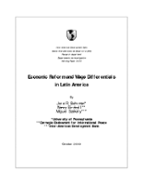Economics Reform and Wage Differentials in Latin America
Date
Oct 2000
This paper develops and applies a new approach to the estimation of the impact of economy-wide reforms on wage differentials, using a new high-quality data set on wage differentials by schooling level for 18 Latin American countries for the period 1980-1998. The results indicate that reform overall has had a short-run disequalizing effect of expanding wage differentials, although this effect tends to fade over time. This disequalizing effect is due to the strong impact of domestic financial market reform, capital account liberalization and tax reform. On the other hand, privatization contributed to narrowing wage differentials, and trade openness had no effect on wage differentials. Technological progress, rather than trade flows, appears to be a channel through which reforms are affecting inequality. The paper also explores the effects of reforms on wage levels; tentative results suggest that reforms have had a positive effect on real average wages, but a negative effect on the wages of less-schooled workers. Keywords: reform, inequality, wages, trade, distribution



